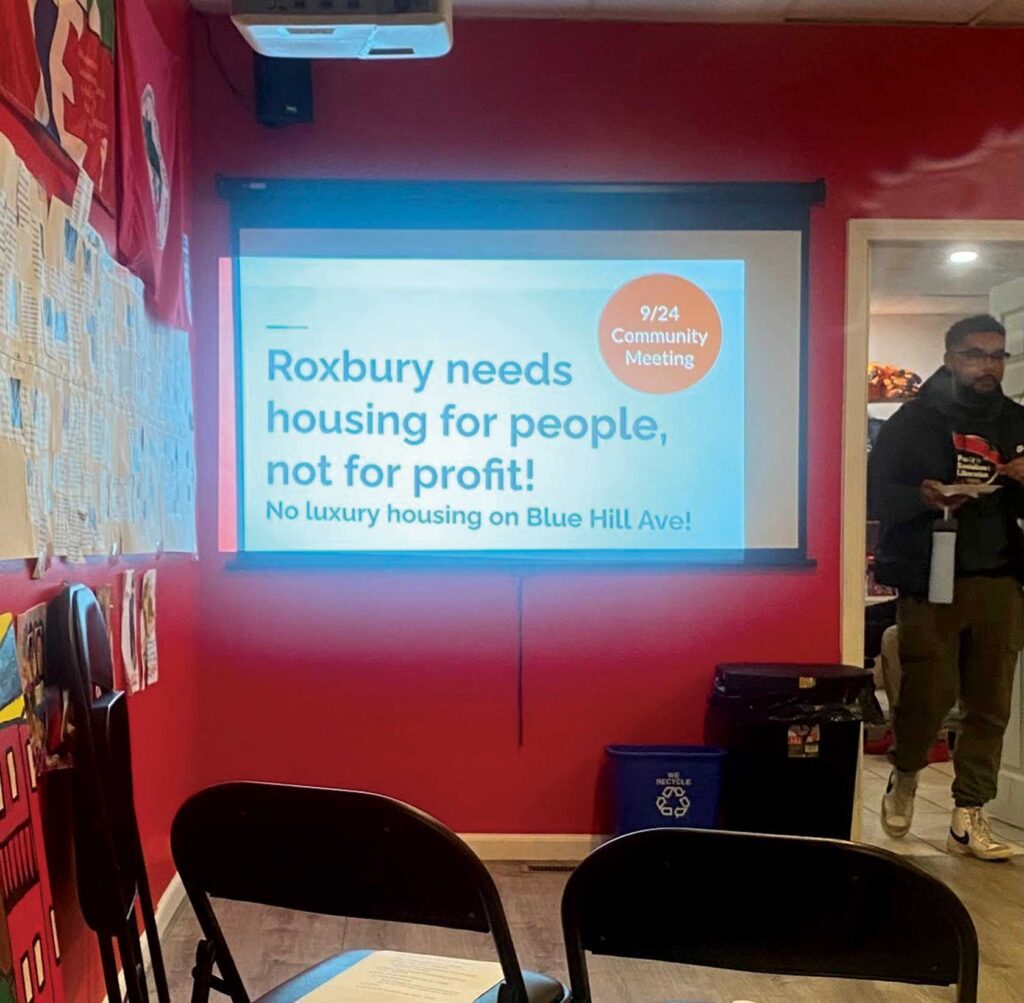Petition aims to resist planned luxury housing on Blue Hill Avenue
Boston Liberation Center leads fight against gentrification in Roxbury

When Will Cecio learned about a planned development that would erect a 36-unit building of mostly luxury housing on Blue Hill Avenue in Roxbury, he knew he had to act.
He and other volunteers were concerned about wealthy entities swooping into the neighborhood and driving residents out, he said.
So Cecio and the Boston Liberation Center, where he is an organizer, decided to push back by launching a petition to fight the development.
“It can’t just be a luxury housing unit where no one is going to be able to afford it,” Cecio said.
Big businesses have slowly been making their way into Roxbury, the geographic heart of Black Boston, over the past several years, with newly added apartment units that are unaffordable to most people in the neighborhood.
Longtime residents, who have been voicing concerns about the influx of unaffordable housing, said they fear they will be displaced, and advocates worry that the Liberation Center’s rent will soar.
Roxbury residents might not feel they have the power to stop these developments, and most don’t know about projects being planned until it is too late, Cecio said.
“I would say there’s probably some racist tensions and undertones as to why, specifically, communities in Roxbury don’t have a say in these kinds of things,” Cecio said. “But then I also think that this is just like the status quo of how development happens in Boston, which of course needs to be changed.”
At issue is a proposal by Edge Real Estate Investments LLC, a Boston company, that would erect three four-story buildings with a total of 36 residential units at 191-203 Blue Hill Ave. in Roxbury. Thirty of the units are proposed to be market rate, the Liberation Center’s petition said.
Residents would have to make $80,000 — nearly double Roxbury’s median income of roughly $46,000 — to afford these units, the petition said.
The petition, signed by over 150 supporters, demands that all of the units be affordable, with rent set at no more than 30% of Roxbury’s median income.
Organizers, who had criticized the lack of public input in the process, are also demanding that the developers and officials at the Boston Planning and Development Agency visit all residents near the building and invite them to a public in-person community meeting before the development is approved, according to the petition.
Officials at BPDA, which is reviewing the project, directed questions to Edge Real Estate Investments. Officials at Edge Real Estate Investments did not respond to a request for comment.
Joe Tache, one of the Liberation Center’s organizers who lives in Roxbury, said he and other organizers went door-to-door to speak to residents about the project and gentrification in the neighborhood. Most of the residents they spoke with knew nothing about the luxury building being planned next door, he added.
Tache said these projects do not help communities, but rather profit the developers and their investors.
“It’s a real problem with the entire system of development, where the power and priority [are] really placed in the hands of people who have money,” Tache said.
Cecio said the Liberation Center is “getting the word out” that the proposed development is a “clear example of gentrification.”
In addition to the door-knocking, the center has held a speak-out, created social media posts and handed out flyers with the petition in an effort to “increase awareness and visibility” while also “trying to bring residents into the struggle,” Cecio said.
At a meeting in September, organizers and residents voiced their anger and frustration about what they see as the development agencies’ lack of concern about what they would be losing. They described a Zoom meeting that BPDA officials had held earlier that month with residents. Tache, who attended, described the officials as “dismissive” and “flippant” instead of tackling people’s fears and concerns.
“I honestly found it very frustrating and disappointing,” Tache said.
In Roxbury recently, residents said they feel they have not been prioritized in the development process in their community.
“I don’t believe any housing should be built that’s only for one kind or one group. It should be for everybody,” said Roxbury resident Arlene Hammerman as she waited for a bus.
Shona Jackson, former resident of Roxbury, said she had witnessed the shift in Roxbury as contractors began buying buildings or land and reselling them at higher rates.
“People are really struggling and no one cares because this is more of a business than a country now,” said Jackson, as she sipped her coffee in Dudley Cafe recently.
Tache said he has also noticed a considerable increase in his own rent over the past few years. Although housing prices have soared across the city, he said it is even more of a “stressful time” for working-class and low-income people.
Residents should not only have a voice, he said, but “real power over what happens in our communities and in addressing the challenges that we face.”
Cecio, who lives in Dorchester, said there is no set date to deliver the petition to developers, but the organizers will iron out their strategies in future community meetings.
He would like to see a “much more transparent and much more collaborative process” with the BPDA developers.
“We want Roxbury to be a thriving community where people have well-paying jobs, people enjoy living in the neighborhood, people will feel safe, people feel like they have a community,” he said.






